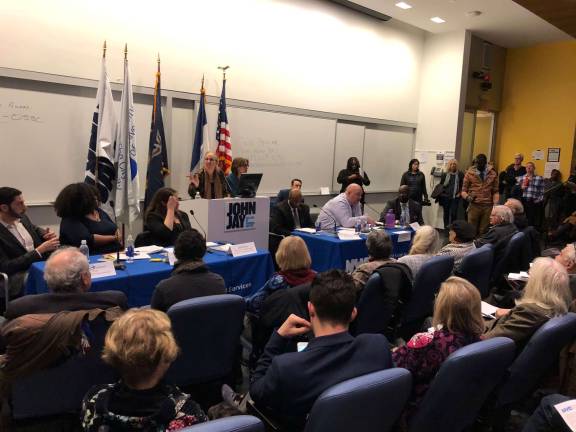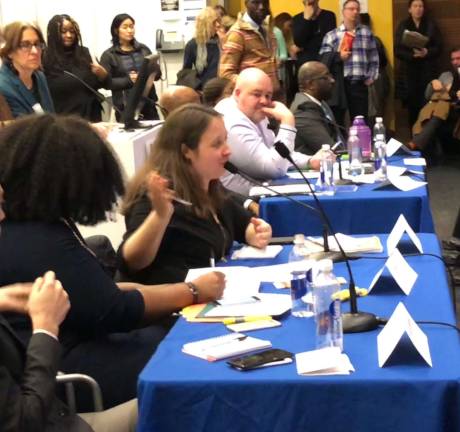Outraged midtown residents and business owners decry plans for a long-term shelter the city is planning near Central Park
BY ASHAD HAJELA AND DOUGLAS FEIDEN
An emotional crowd of roughly 300 people — many of them shocked and scandalized, some with voices raised in anger — packed a West Side auditorium on Thursday, February 8 to denounce a sudden move by the city to place 150 homeless men in the heart of their neighborhood.
The flashpoint was the unexpected, but already underway, conversion of the Park Savoy Hotel, a discount lodging at 158 West 58th Street, into a long-term shelter, one block from “Billionaire’s Row,” in the latest attempt by Mayor Bill de Blasio to grapple with soaring homelessness.
Neighbors, workers and local business owners said they felt blindsided by the secrecy of the planning and site-selection process — and appalled that the community had virtually no notice that a homeless shelter was being placed so close to Central Park, where children and tourists frolic.
Carnegie Hall, the uber-luxe condo One 57 and the swath of West 57th Street that’s filling up with slender towers for foreign billionaires is just around the corner to the south, while the Essex House, the New York Athletic Club and the horse-drawn carriages are just around the corner to the north.
Billed as a “Community Conversation on Transitional Housing,” the briefing, sponsored by the city’s Department of Homeless Services and DHS’ nonprofit social-services provider, Westhab, quickly became a forum for booing, screaming, hissing — and repeated cries of “Set up! Set up!” and “Not in this neighborhood!”
“Why was there no discussion before tonight?” demanded David Achelis, president of the West 50s Neighborhood Association. “Why was the community ignored?”
Fears of a possible rise in crime from the presence of single adult homeless men was a paramount issue for the audience.
“My concern is for the safety of our residents ... the children, the seniors,” said Andrew Warren, a resident of 152 West 58th street, which immediately adjoins the Park Savoy, and he called for screening to determine if the new tenants have records for sexual offenses and other felonies.
Not everyone in attendance was opposed to the shelter’s presence. Indeed, David Freudenthal, the director of government relations for Carnegie Hall, started to make the case that the need for such a facility was imperative.
“I came here tonight to share some of Carnegie Hall’s very positive experiences working with homeless services,” he said, noting that DHS makes a point of encouraging shelter residents to engage in culture and the arts.
Community members didn’t want to hear any plaudits. Freudenthal was interrupted and shouted down. Other supporters got the same heckling treatment.
The scene was a community question-and-answer session in a jam-packed space in the John Jay College of Criminal Justice at 524 West 59th Street, where Manhattan Borough President Gale Brewer, who moderated the event, struggled to control the unruly crowd.
Passions ran deep: “In a few years, you will see the disappearance of my business and the rundown of the neighborhood,” said Sophie Shane, whose family-owned business, Apple Engraving, provides custom framing and engraving services in a shop at 120 West 58th Street.
A Spring Debut, a $63 Million TabBut DHS argues that the Park Savoy will provide shelter to the homeless in their home borough — and as close as possible to the jobs, family, schools, health care, social services and other support networks in the communities they last called home.
The exact timetable for the shelter’s debut wasn’t immediately clear, but DHS says its target for an opening is “early spring.”
The value of the city’s contract with Westhab is $7 million a year for five years, and it’s renewable for another four years, so it’s basically a nine-year contract term totaling $63 million, according to Jackie Bray, the deputy commissioner for homeless services at DHS.
“But I don’t want to give anyone the impression that after nine years, the site goes away,” Bray told the audience at John Jay.
Westhab leased the site directly from the hotel’s owner, at an annual rent of $2.6 million, and the city will then reimburse the nonprofit service provider for the rent, DHS said.
Priority will be given to the placement of men from Manhattan and, when possible, people who hail from Community Board 5, which takes in Midtown, Midtown South, Times Square and the Flatiron and runs from Eighth Avenue to Lexington Avenue and 59th Street to 14th Street.
The mission: Keep them sheltered in the communities in which they still may retain roots and loved ones and friends. Offer them an opportunity to find work and maintain hope and a helping hand to get them back on their feet.
In an effort to mollify community opposition, DHS and its partner Westhab, which will manage the facility, says it will install a total of 56 security cameras both inside and outside the facility. Recordings of any illegal activities will be provided to police in the case of arrests and prosecutions.
There will be a six-person security staff on every shift, and a minimum of two security guards posted at the building’s entrance. Access will be tightly controlled, and security cameras will be monitored 24-7. House rules will be enforced and “good neighbor policies” maintained.
A 24-hour hotline will be set up to encourage community feedback.
Residents will also have to adhere to a 10 p.m. curfew unless they’re working nights.
How does the curfew work? “This is not a jail,” said Jim Coughlin, the senior vice president of services at Yonkers-based Westhab. “If someone wants to have a cigarette at 11 o’clock at night, they’re going to have a cigarette at 11 o’clock at night.”
The smoking facilities, he added, “will be outdoors.”
His antagonists from the neighborhood didn’t relish the idea, and another disapproving chant echoed from the crowd, “Outside our windows!”

